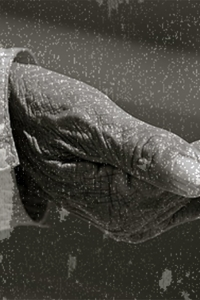
Monsoons in Kolkata are but a vicious torment to the feriwala (travelling hawker) who go around streets selling their merchandise. The police are a constant annoyance for 12 months of a year and the monsoons double it up for the two months it stays in the city. It literally brings everything to a state of destitution, more so, these unfortunate feriwalas most of whom earn their livelihood from the streets.
In this business one cannot hope to sell one's wares if one is confined indoors because of the merciless monsoon rains. This morning the sky had cleared up a bit which had prompted Jamal to leave his house. However, within an hour the sky had again broken out in torrential downpour. Jamal took refuge under the balcony of an old dilapidated house and cursed both his luck and the weather. But his body seemed to accede to this sudden recess. As if it actually welcomed this abrupt opportunity to rest. It seemed to Jamal that his body was getting feebler by the day. He was getting tired too easily.
The damp weather had sorely manacled his earnings which in turn had affected the food supply for him and his family of four. He had two saddlebags, one that contained sarees and bed sheets and the other that contained handmade towels (Gaamchha) – both that had never seemed too heavy for him to carry now felt like a considerable weight. But it puzzled him why on earth would his load become heavy? Where would he get supply of wares that would make his consignment heavy? He had started his career by hawking towels; it’s only recently that he had taken on the sarees and bed sheets.
Nowadays, he reeled under the weight of his saddlebags, within a few miles of walking he used to feel breathless. Walking seemed difficult by the day and he just somehow dragged his body ahead. Shouting out his wares seemed to take a lot more effort and his lungs almost burst out in violent bouts of cough.
‘Do you sell sarees?’ A feeble woman’s voice came from behind.
On turning back Jamal saw a little boy, maybe six or seven in a scraggy shorts and dirty shirt leaning against the half open door. But the enquiry didn’t come from him. It came from a woman behind the door.
‘Yes Ammi, I have sarees. Do you want to see some?’
‘Yes, please can you show me some?’
Jamal handed over the black and red Taangail saree to the little boy. This was the best he had in his lot. A trifle expensive, too. But it was one of the best of the lot bought from the Akram Mia the best weaver at Kalihati. This one had a red Jori or silk yarn that was used for making its edges. This was one of notably the best amongst his hand woven Taant (cotton) sarees and the most expensive too. Jamal had been carrying this for the last twelve days without any luck. No one was ready to buy such an expensive saree. As a matter of fact no one even wanted to further the negotiations once Jamal quoted his price.
The same thing happened here as well. Once he mentioned the price, the saree was promptly returned to him.
‘Don’t you have anything cheaper?’
He showed three to four less priced cotton ones through the little boy, which was returned with no consequence. Things started reaching the negotiation levels once he sent his light green Taant with a diffident red border. Jamal raised his price to ten rupees as he excitedly eyed his ware, while the other party slowly raised her quote from four rupees. The deal was finally settled for six rupees.
The ladies have become experts in arbitrations thought Jamal. A man would probably hesitate to quote almost half price of an item but the women do it so effortlessly. The little boy handed over to him a one rupee note and another rupee in coins. Two rupees in total.
‘Can you please take the remaining after two days?’ Came the gentle implore from inside.
‘I am sorry Ammi I don’t sell on credit. I have a very small business and I really can’t afford to give out credit,’ was Jamal’s firm but snug response.
But Jamal did give out credit to his customers. His transactions were usually in the afternoon with housewives. In most cases the ladies didn’t have enough money or sometimes even if they had the money, they didn’t have the authorization to spend it. Hence the possibility of credit always loomed in his occupation.
He had to comply to this even if the customer was a complete stranger. Sitting in the corridor he normally tried to gauge about the family from as much of the room indoors, the manner of talking and the over all demeanor of the customer that was visible to him. He needed to use this information to evaluate whether it would be judicious to leave his merchandise with them on credit. But this customer had been completely evasive. She had carried out the entire transaction from behind the doors, not coming out even once. The ladies rarely held any inhibition to come in front of a feriwala.
This was no situation where one can consider the possibility of giving out credit. One might even encounter a direful situation of being told ‘Why, no one had taken any saree in this house?’ ‘Who did you sell your ware to my man?’ Again the soft beseeching voice peters out from inside, ‘If you come back in just two more days, you’d surely get back your money. Please believe me.’
‘I am sorry Ammi. I am helpless.’
There is silence for a while. Then the door creaked open and a dark-skinned lady steps up to him behind the door wearing his green and red saree.
‘You have called me Ammi, you have to give me two days’ time else you have to open it from my body.’ She said in a doleful tone. ‘My clothes are all gone. I could only come in front of you wearing your saree.’
Jamal didn’t have anything to say after this. He waited for half an hour more in that porch and quietly left with an insipid state after the rain subsided. He was now in the hem of the city and the village. He walked slowly through the meandering muddy roads and sometimes shouted his wares. The city and the village have not completely merged in this place. It had merely come close abruptly intermingling in a few places. The moss covered pond still created a stark contrast with the dazzling neighbouring cinema hall and the gap was much wider than the small stone wall that separated it.
There were so many vendors who walked the streets of the city, but Jamal knew very well that it’s the call of the cotton printed sarees and blouse that received the highest attention in these neighborhoods. Many inquisitive and tempted feminine faces came peeping behind the curtains only at the sound of this particular merchandise.
Just after sunset Jamal started back towards his small house near Rajabazar.Before reaching his house he crossed another vendor like him carrying a basketful of aluminum utensils. He stopped Jamal and asked, ‘How much are the sarees brother?’
‘It ranges between fourteen and fifteen rupees.’
‘Fifteen! You don’t have anything around ten?’
Jamal quietly nodded and started walking over towards his house.
At home Amina asked him about his day’s business.
‘Not good.’
Amina’s saree he observed was almost in tatters. She usually wore it at home. She had another one that she had kept carefully to be worn when she went out to do the cleaning work at Chowdhury Babu’s house. He himself had only one more set of shirt, a torn trouser and a Gaamcha.
Jamal lowered his two saddle bags in one corner and stretched out on the old bedstead. Amina kept on talking with her monologue. ‘I know you’d get angry if I tell you, but believe me I had no other options – I had to buy an aluminum pot to cook from the vendor.'
She paused and then continued again. ‘The last one had worn out in several places. I couldn’t get myself to tell you this. But I have to cook rice as you know. The last two days I have been boiling rice in that earthen pot, but this morning even that broke.’
She paused again anticipating a reply from Jamal and continued, ‘But I have done something smart. I took this on credit from the vendor. Such a small bowl but he was asking two rupees for it. But I drove a hard bargain and made him agree to sell it to me at 75 paisa. As luck would have it, I didn’t even have that money to give him. I told him that let me check if there are any cracks in it today and I would pay him tomorrow. But he was so adamant. He would just not give in. I quickly had to wash the bowl and start steaming the rice on a half lit oven to prevent him from snatching it. I called him inside to show him that. So, he had to give in. He couldn’t have possibly taken his bowl away from the oven.'
Jamal mused over the thought whether the rice would taste different cooked in a new bowl. Would the pungency of the cheap rice be a bit diluted? Would the rice not get brittle as it cooled? It was amusing to notice how dolefulness smears shades of childish frivolousness on one’s imagination.
The rain didn’t show any indication of stopping the next morning. It had started in the wee hours of the morning. A part of the room was already wet and damp with the water leaking from the roof. Thankfully the roof was slanted which prevented a larger leakage. Jamal was grateful for that. This arrangement saved the bedstead from getting soaked. Also, the bedding and his saddlebags were saved along with the two kids. Jamal had thought that he would start early this morning so that he could catch the lady’s husband before he left for work, to recover his money. But the rain had raised a barricade to that design. Who knew if the rain would even stop today or not?
Amina walked in with a sullen face. ‘How can I go to work on a day like this? If I don’t report for duty Chowdhury Didi would be upset again.’
Amina is dark-complexioned but her hands and feet had become white with decay caused by excess exposure to water and detergents. As if her skin had started to rot.
Jamal said, ‘Let her get upset. What can one do if it is pouring like this?’
Amina shot a glance at the carefully stacked pile of clothes on the bedstead and replied, ‘As if what you say would make any difference. If she’s upset she would not give me the bonus during the Puja. Last week I couldn’t go in morning because of Banu’s fever and she told me clearly that my absence can wrest me of my bonus.’
‘So what if she doesn’t give. We are not beggars Amina.’
‘This is no begging. All the other maids get their Puja bonus. We work throughout the year and the bonus is deservedly ours.’
Jamal gave her a smug look and said, ‘Bibi those are all old rules. No one follows them anymore. Just wait and see how many people get your Puja bonus this time. Do you feel there’s any rule or ethics left in this country? Why else would I be selling clothes on the streets even with a proper degree and you would be working as a house maid.’
Amina sighs, ‘I think she had come to know that you would not let me work in any other house. Why else would she suddenly become so brazen? All the other maids leave their jobs at the drop of a hat.’
Jamal could not let Amina work in any other house. Chowdhury Babu’s house was close to their home. There was no other man in that house except the old Chowdhury Babu. It was with a lot of covenant that he had agreed to let her work here. Besides he didn’t want to make Amina a classified house maid.
In the meantime, the next door neighbor Paritosh’s ten year old boy came in. ‘Baba is asking for a new Gaamchha. He said he would pay at the end of the month.’
Jamal replied ‘No. Tell him that I don’t sell on credit.’
He goes back only to come back again to ask for the price of the Gaamchha. After a while Paritosh walks in himself wrapped in a bed sheet.
‘Jamal I had always bought my Gaamchha and underwear on credit from my friend’s shop. But today I am being forced to buy in cash because of a misfortune. Would you believe someone can steal Gaamchha? And one, which I had been using for over a month?’
‘Stolen?’
‘Exactly. I have only one set of clothes that I wear to work and the Gaamchha that I use to take a bath in. God knows who has filched it. I hope the one who has pinched my Gaamchha gets my rheumatism too. I thought I would go for my bath without any clothes then hesitated against it.’
Paritosh laughed opening his partially toothless mouth.
‘What happened to your dhoti?’
‘Well you can say that had also been filched. The only difference is that it had been filched by an insider. It is now being used by my wife instead of her petticoat. She says she feels ashamed to wear her saree without anything underneath. I had to give it to her. It is ridiculous of her to afford such modesty at this age.’ Paritosh guffaws again in his brazen laughter. He looks at Jamal’s sarees and says ‘I would have taken one if you would have given me credit. But you say it is against your business policy.’
Jamal kept quiet for a while and asked ‘What would you wear after coming home from work?’
‘Well if my wife returns my Dhoti I shall wear it else your Gaamchha – I hope it would dry up by then.'
Once Paritosh left Amina asked ‘So how much did you earn sitting at home?’
‘Earn my foot. I had to sell him in cost price. ‘
‘Oh God! I thought the day had started propitiously and it’s a matter of time before you would sell your entire merchandise once you go out.’
The oven had been set precariously so as to protect it from the leakage on the roof. Amina sat next to it chopping vegetables. Today it was only boiled vegetables and rice for lunch. They had not tasted Daal for a very long time now. It was not as if Jamal was completely bankrupt. He still had some cash saved in the old box, money he had made selling his merchandise. But it was kept safe as capital fund to buy merchandise from the whole seller. There’s money but not the luxury to spend it. Who else but Jamal could realize the ascorbic irony of this self-restraint?
The rain stopped after midday. The overcast gave way to streaks of blue skies from where sunrays streamed in. Jamal got ready to go out. Amina reminded him, ‘Please leave the money for the Aluminum vessel else the vendor would be rude.’
Jamal wondered if he also could be rude and derisive towards that lady who had bought the saree from him in credit. He was about to leave when he saw Paritosh also getting out.
‘Didn’t you go to office Paritosh Da?’
‘How can one get out in this rain?’
His office must be a very considerate one that allows half days to workers stopped by rains concluded Jamal.
‘Which way are you going?’ asked Jamal
‘Towards Bowbazar.”
The Feriwala must not be fixed to one particular locality. He had to go all over the city. The neighbourhood you visit today you can only come back here after a space of four to five days. The rain had given Jamal a bonus reprieve during the morning, so he sets off in full steam to make the most of whatever was left of the day towards a crowded precinct. The market is closer from that place, but it doesn’t affect his business. The women did visit the market for sarees, bed sheets, etc. but not in this colony.
This block of the city was packed with houses almost falling on each other. He went shouting his wares. His voice had a couple of ladies ushering him to the landing of their building to see his sarees. While the ladies were busy looking at his stock another voice of a vendor was heard in the vicinity. This man was selling table cloths and ladies blouse. The ladies also called him in. Jamal was shocked to see the office clerk Paritosh walking in with his saddlebag containing table-cloths, blouses and frocks.
Paritosh gave him an understanding smile and said, ‘Surprised? Hang on I would tell you everything.’
Both got to sell a substantial amount of their wares. Jamal even got to sell his black and red Taangail to a middle aged woman with a hefty profit margin. Paritosh sold a few blouses and a frock. Looking at his vending ability Jamal deduced that Paritosh was quite experienced in this profession.
Once out in the streets Paritosh disclosed to him, ‘What to do brother? I didn’t have a job for the last few months. I tried hard but there is hardly any employment anywhere. So, I thought why not try out your profession. I didn’t have much savings as you know’
‘But why did you hide it? Are you ashamed of this profession?’
‘Ashamed? Nonsense! One cannot afford to be ashamed on an empty stomach. But you know Jamal; I have just recently arranged a groom for my eldest daughter. The wedding is scheduled for the end of August. They have agreed to this matrimony knowing that I have a clerical job. What if they break the engagement knowing I peddle clothes on the street? This anxiety had thwarted me to confess my real profession. I don’t even carry my saddlebags home. I leave them at a friend’s shop and collect it the next morning. I plead to you Jamal; please do not breathe a word of this to anyone.’
‘I would never do that Paritosh da after knowing everything.’
‘Let me wear the pretense of a Government clerk till I can get my daughter married off happily then I would take this façade off. I might even go in front of her in laws house and shout my wares.’ Paritosh again let out his partially toothless chortle.
After that they went their separate ways as there was not much time for idyllic talk.
One more day came to an end. A dry half of a day in the monsoon months. Jamal started his journey back home. He decided to pay a visit to the lady ignoring the desperate fatigue and exhaustion that he was feeling then. It was also a long detour from home. If her husband was home then recovery would be easier.
As he approached the house he saw that the main door was open today and a man hardly in his twenties was standing on the portico smoking a cigarette. Jamal pointed towards the closed door where he had made his transactions to the young man and asked ‘Can you please tell me if the Babu who lives in this room is at home or not?’
The young man nonchalantly replies, ‘I don’t know...maybe. You can always knock.’
Jamal gave a couple of hesitant knocks on the old dilapidated door. The little boy opened the door and looked at him.
‘Is your father at home?’
‘Baba has not gone out today. He has very high fever.’
A man’s voice came from inside, ‘Who is it Bablu?’
‘That saree vendor Baba.’
A man walked out to the door. He had wrapped himself with an old tattered mattress. His eyes were red with high fever. The vendor he had met yesterday outside his house, who had sold his wife the Aluminum vessel stood in front of him. Seeing him Jamal almost forgot his intentions to collect his dues for the saree, instead all he could think of was that since this man had high fever he would not be back in a while to collect money from his wife.
About the Author





Comments